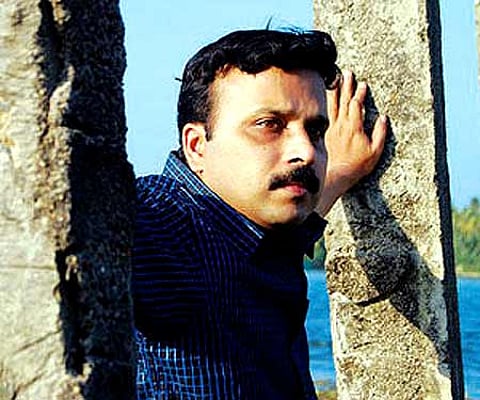

If he could have his way, M S Banesh would have given up his job and pan the camera to the stark realities in society. Which doesn’t mean he is not pursuing the second part of that wish now.
As the News Editor and head of Current Affairs, Jeevan TV, he is now presenting ‘Kazhchapathippu’, a documentary series on the channel every week (Saturdays 10.30 p.m., repeat on Sundays at 8.30 a.m.). It is a visual sojourn which talks of those who are either ‘caught in the visual frame or thrown out of the visual frame or who are not at all needed by any visual frame’.
Banesh is a veteran when it comes to using the power of the visual media to tell heartwrenching or heartwarming tales.
A three-time State Television Award winner for documentary, Banesh takes pride in the fact that he has travelled this far holding on to a genre - documentary - which has not yet made a strong foothold in Malayalam television industry.
“I strongly feel that here documentaries are not promoted much by the channels mainly because of the cliches which have crept into narration, the language and presentation. In fact, documentaries can be made as interesting as feature films,” Banesh says.
Definitely, he has followed a different style of presentation. “The protagonist, whoever/whatever, communicates with the viewers,” he points out. An example being a docu on Murugan, a youngster in Kochi who has devoted his life to help the homeless. “Instead of going for a narration on who and what he does, the camera is held towards a day in his life. He talks of himself,” Banesh says, adding, “You won’t believe what happened after the first part was aired last week. After seeing the episode, a girl from Dubai called up Murugan saying she would like to marry him!” (The continuation would be aired today at 10.30 p.m. on Jeevan TV).
Banesh strongly feels that certain images are more than enough to tell a story, rather than going for a narration. There is this scene in his documentary ‘Vilasam Vichchedikkapettavar’ which narrates the condition of those rehabilitated in the Libra Hotel near Ernakulam North Railway Station. The hotel was mainly used by artists who were cast as extras in movies.
Later on, the Cochin Corporation used it to rehabilitate families that were evicted from the sides of the Perandoor canal in the district. “There is this image in the documentary which shows a newborn child crying aloud lying on a flex sheet on which is written ‘Vote for CPI leader Panniyan Raveendran’. The mother has no other place to put the baby. That image was more than enough to convey her plight,” says Banesh.
Which also underlines the fact that he has always given a political perspective to all his works. “I don’t go for mushy sentiments. The visuals say it all and in the end I connect it with the political milieu,” he says.
And he is happy that he has never been stopped from doing so. Neither when he was working with Kairali Channel (as senior news producer from 2000 to 2009) or now with Jeevan TV. An example has been the State Award he received for ‘Garbhinikalude Ward’ (2004) when he was working with Kairali. “It showed the plight of labour wards in government hospitals. The UDF was in power then and the documentary was aired on a Left-run channel. Still, I was chosen for the award, which was quite surprising,” he says. Banesh had presented ‘Varthavaaram’, a docu series on Kairali which ran into 500 episodes.
A native of Kodungalloor, Banesh started his journalistic career with Asianet, as presenter of ‘Vyakthiveekshanam’. Then he became a staff reporter with Kalakaumudi magazine and later moved on to Kairali.
The love for documetaries is rooted in his penchant for poetry. He began writing poems while still in school. “Documentary is a medium which I could easily relate with and I am happy that some of my works have played their part in a few prominent issues,” he says. An example, is ‘Maha Agnus Devi’, which is about Agnus, a woman who was evicted from her home at Moolampally in Ernakulam for the Vallarpadom project. Banesh compares her with Bengali writer and social activist Maha Swetadevi.
“I strongly believe that this work had played its part in the implementation of the Moolampally rehabilitation package which the State Government announced within a week of its screening.”
It was in 2002 that he made ‘Periya Iragal’ (Big Victims), which talked about Endosulfan victims. “It took 10 years for those in power to ban the pesticide,” he rues. In fact, early this year, this documentary had many public screenings.
Some other notable works of Banesh are ‘Shavamuriyil Ningaleyum Kaathu’, ‘Ulladakkangal’ (both State TV award winners), ‘Chandanathaal Murivettavar’ (Film Critics Award winner), ‘Asahyan- the Vanishing Breast’ (came second at a national-level documentary fest), ‘Kali-The Flaming Faces’, (a critical appraisal of the ‘therippattu’ of Kodungalloor Bharani festival, the script of which was adopted as the cover story by ‘Bhasaposhini’ magazine) etc.
For more on Banesh, log on to http://msbanesh.blogspot.com/